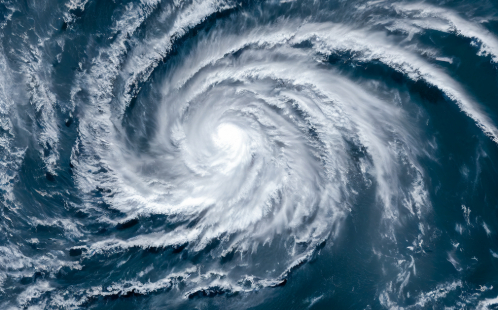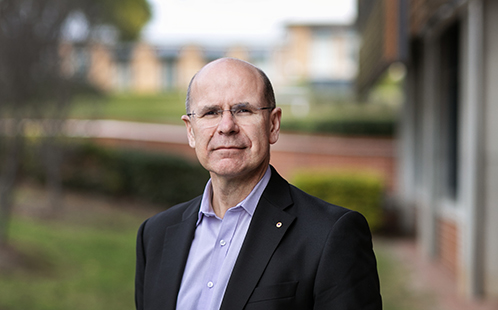Western Sydney University experts available to discuss Cyclone Alfred

As Cyclone Alfred prepares to landfall experts weigh in on water quality, how families with young children can prepare for natural disasters, melioidosis outbreaks, building and structural resilience and more.
Associate Professor Ian Wright, Western Sydney University
School of Science - water quality and ecological impact
Associate Professor Wright teaches classes in water science and management, environmental planning and environmental regulation. He has been a water scientist for more than 30 years and now leads a small team that conducts high-impact and highly engaged research that addresses water resource sustainability issues. He has published research on the water quality and ecological impact of wildfires on streams and high conservation-value peat wetlands in the Blue Mountains area, including the Greater Blue Mountains World Heritage Area.
"Flood waters create many obvious hazards to life and property - but perhaps a less obvious one is that they can be highly contaminated. Flooding of urban areas often disrupts sewerage systems and triggers faecal contamination of flood waters. Also, the electricity, telecommunication and drinking water systems can also fail, due to flood damage. These problems can last for weeks after the flood peak has passed and the clean-up work begins.”
“I urge people to limit contact with floodwaters and post-flood residues. Also, care needs to be taken if people have any cuts or scratches that may allow flood-contaminated waters to cause infections. Remember that young, elderly and others with weaker immune systems will need to be particularly careful. Having a first aid kit at hand will be important.
“If possible, have bottled water available for an emergency. Or be prepared to boil water. If you can, whilst you have clean drinking water available, fill empty bottles before floods may eventuate.”
Adjunct Associate Professor Karleen Gribble, Western Sydney University
School of Nursing and Midwifery - young children and families in emergencies
Adjunct Associate Professor Gribble is a world-leading researcher on infants and young children in emergencies and has been involved in research, policy development and training in this area since 2006. She conducted the first comprehensive study of the experiences of families with babies and toddlers of an Australian disaster with the Babies and Young Children in the Black Summer (BiBS) Study.
“It is particularly important that those who are more vulnerable plan to leave early in the event of a disaster. This includes pregnant women and parents with babies and toddlers. We know that caring for children means that everything takes longer, this includes evacuating. Parents should plan to leave early, pack an evacuation kit for their child, and arrange to evacuate to a friend or family member's home rather than an evacuation centre if possible.”
"Members of the community can play an important role in supporting pregnant women and families with babies and toddlers in disasters. Friends and family who have a home that is safe in the disaster can offer it as a place of evacuation. In evacuation centres, community members and emergency responders should check in with parents, especially mothers who have evacuated on their own with small children, and ask if they have everything that they need. Providing a separate and supported space in evacuation centres for pregnant women and families with very young children can also help to keep them safe.
"In the aftermath of disasters, it can be difficult for parents, especially mothers, to look after themselves and their children, especially their babies and toddlers. It is vital that disaster recovery interventions are provided to take care of mothers so they can take care of their babies and toddlers. In the humanitarian emergencies, this support has been provided for over 25 years by an intervention called the Mother-Baby Area. MBAs provide a safe and welcoming space for pregnant women and new mothers to connect with other women, to receive support and assistance in caring for their children and referral to other services. MBAs have been shown to increase mothers’ social connectedness, reduce mothers’ stress and suffering, improve the quality of interactions between mothers and their children, increase uptake of positive health behaviours. MBAs should be deployed in the aftermath of Cyclone Alfred in southern Queensland and northern NSW).”
Following on from the BiBS Study and with the assistance of Professor Gribble, the Australian Breastfeeding Association has developed resources to help parents and to help emergency responders to support families with young children during and after Australian disasters including evacuation kit lists, guides on keeping infants safe in evacuation centres and the Mother-baby area guide for Australia. For more information, visit https://www.breastfeeding.asn.au/emergency-resources-babies-and-toddlers and https://www.breastfeeding.asn.au/supporting-families-emergencies.
For further insights, read Adjunct Associate Professor Gribble’s recently published paper on the experiences and support for caregivers during the 2019-2020 bushfires: Experiences and Support for Caregivers of Infants and Young Children (opens in a new window).
Dr Ehsan Noroozinejad, Western Sydney University
Urban Transformations Research Centre - hazard resilience, climate resilience and emerging technologies
Dr Ehsan Noroozinejad is a Senior Researcher who specialises in Smart Resilient Construction and Infrastructure. His research focus is on Innovative Smart Solutions to resolve housing and climate crises in Australia and developed countries. He is the engineering editor for ASCE Natural Hazards Review.
“The recent devastating impact of Cyclone Alfred in Queensland with the forecast of ferocious winds and catastrophic flooding could submerge 20,000 Brisbane properties. It underscores both the immediate and systemic vulnerabilities in our infrastructure and emergency preparedness frameworks to be multi-hazard resilient.”
“Enhanced resilience could be achieved by integrating cyclone-specific strategies within our broader risk management approaches, including reinforced structures and infrastructure codes, adaptive urban planning, and improved early warning systems. Leveraging advanced digital tools for real-time monitoring, communication and community engagement will be essential to minimise future damage and significantly strengthen overall disaster resilience.”
Dr Thomas Jeffries, Western Sydney University
School of Science - environmental microbiology, emerging diseases, historical pandemics
Dr Thomas Jeffries is a Senior Lecturer in Microbiology at the School of Science, Western Sydney University. His work involves studies related to the human microbiome, marine biology, soil, environmental microbiology, and climate change impacts, with applications in water management and marine ecosystems.
"Potential flooding as a result of Tropical Cyclone Alfred increases the risk of people becoming infected by melioidosis. Whilst melioidosis is most common in the far north Queensland and the Northern Territory, cases have been detected further south in previous years raising the possibility of new cases emerging in the wake of Cyclone Alfred. People should avoid floodwaters and mud as much as possible, cover any open wounds and avoid inhaling water droplets from floodwaters."
To arrange an interview, please email media@westernsydney.edu.au.
ENDS
7 March 2025
Latest News

ABC RN transcript: Vice-Chancellor Professor George Williams discusses higher education sector, student support, and the impact of AI
The following is a transcript of an interview that aired on ABC Radio National Saturday Extra between presenter, Nick Bryant and Vice-Chancellor, Distinguished Professor George Williams AO.

Western Sydney University are the number one Australian solar car team at the 2025 Bridgestone World Solar Challenge
Western Sydney Solar Car team has crossed the finish line placing preliminarily sixth in the world overall, and the number one Australian team in the world’s most prestigious solar car challenge.

Western Sydney University Statement on Cyber Incidents
Western Sydney University has issued an update to its community following confirmation that previously stolen personal information was published online, including on the dark web.
Mobile options:

